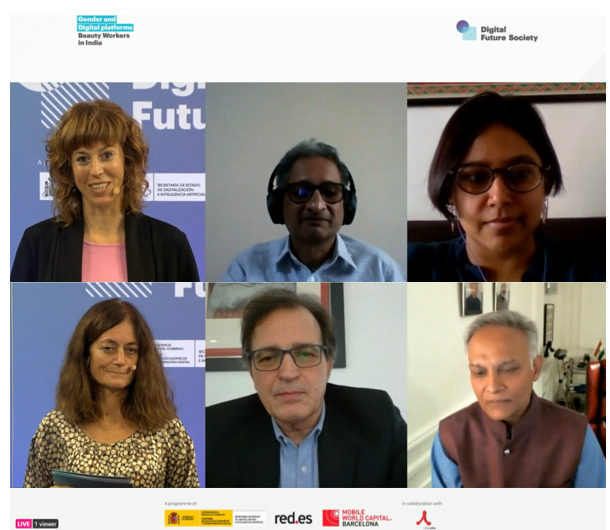
- The report “The Gender Dimension in Digital Platforms: Beauty Workers and Their Clients in India” aims to provide insight into the experience of women in digital work platforms
- Digital Future Society and the International Institute of Information Technology in Bangalore (IITB) work on a common report, based on the experiences of workers and clients who use digital platforms, a booming service in most regions of the country.

6 October, 2021
Barcelona, October 6th, 2021.– Digital Future Society and the International Institute of Information Technology of Bangalore (IIITB) have launched the report The Gender Dimension in Digital Platforms: Beauty Workers and Their Clients in India. The presentation counted with the collaboration of Casa Asia and the intervention of ambassadors from India and Spain, as well as the contribution of the main investigators of this study.
The report aims to provide knowledge about the experience of women in digital work platforms focused on the beauty sector, a highly feminized sector. It is an in-depth analysis of the experiences of both workers and clients, who frequently use these platforms in India. Digital work platforms have established in global labour markets. Carlos Grau, CEO of Mobile World Capital Barcelona affirmed that “In the present moment we are testimonies of a growing tendency that highlights a new relationship between workers and customers via digital platforms. India is a clear case to observe, as it is one of the largest and fastest-growing technology markets with 8% of the world’s platforms”.
As José María Ridao, Spanish Ambassador to India, highlights “Sometimes we don’t feel like technology is a tool, but it is a very powerful tool. In the case of this digital world, it is a powerful one. It is important to remember this because we must choose to deploy these emerging technologies. Considering social and economic aspects. The pandemic has permitted us to reflect how these new technologies can be used to dominate this social divide and integrate our societies”. In addition, Sanjay Verma, Indian Ambassador to Spain, added that “The pandemic does suggest a period of certain stress for labour opportunities and more importantly women workers, they have suffered as this report reflects. Access to digital equipment falls behind when it comes to women and this needs to be tackled”.
Likewise, Cristina Colom highlights the importance of this joint study between Digital Future Society and IIITB “this is the first report to focus on gender within digital platforms, it aims to be a first step towards a near future comparison between different sectors and countries that focuses on the experience of workers, but also takes into account the diversity of existing business models within labour platforms and their impact on the economy and workers themselves.” As Olivia Blanchard, researcher at the Think Tank of Digital Future Society and co-author of the report, comments “It’s very important to see what’s going on beyond our borders and pay attention to countries with a platform economy as advanced as India. In fact, in Spain there are already apps that offer pedicures and manicures at home in several cities and the sector could grow more in the upcoming years.”
Key points of the report: salary, flexible hours and job opportunities, some of the main incentives for female workers
According to the study, employees of both platforms operating in the country (Urban Company and Yes Madam) are attracted to work on digital labour platforms, mainly because they are offered a higher salary and better employment opportunities. The reconciliation of personal and professional life is another positive aspect, thanks to the flexibility and working conditions they obtain, since, for the most part, they earn more than the monthly minimum wage compared to a conventional beauty salon. This means that, in general, they can also increase their savings capacity.
The profile of their employees is around their mid-thirties, with a medium age of 32 with only their secondary studies completed. Initially the companies do not require any specific title, nevertheless, they do offer entry level training and other supplementary trainings.
At a contractual level, all workers are self-employed, even though they impose regulations and control key aspects of their activity. As Balaji Parthasarathy, Professor at the International Institute of Information Technology de Bangalore, exemplifies “Platforms expect workers to buy all their products through the company, it is profitable for them, but it also protects workers from the liability if something occurs. This aspect is also well received by customers as they know where the product come from and its quality”. Another aspect, strictly analysed by the company, is their punctuality, their movements around the city during work hours or any revoked services, if an employee denies a service, they must grant the company with a plausible explanation.
The evaluations received from clients is one of the aspects that worries most of the platform workforce, since it can impact their positioning and work capability. Clients can rate on a scale from 1 to 5 (in the case of Yes Madam) or 0 to 5 stars (in Urban Company), for the offered services. Urban Company expects employees to receive ratings of at least 4 stars or more to remain part of the company. If the evaluations they receive are below 4, workers are unable to accept any more services and their profile on the app is automatically blocked until further notice. To resume work employees must assist a training programme related to those aspects that were negatively rated in the comments.
Profile of customers: comfort, time saving and price, the main reasons to request platform services
According to the study, the main incentive for clients to request beauty and care services through digital platforms is the saving of time. Preeti Mudliar, Assistant Professor at the International Institute of Information Technology de Bangalore, highlights that “Offline beauty salons are challenging in many ways, appointments, time commuting and other dependencies that all add up, so women seek for ways to minimize the effort and time dedicated to get themselves relaxed or groomed with platform services”. Thus, it is practical for clients to be able to determine open time slots where they can schedule services, instead of making an appointment in salons, since they avoid crowds. Finally, price is also a key aspect: most customers value positively that the rates offered by digital platforms are cheaper than beauty salons.
Despite the rise of the services in India, there are still some services related to hair, spa, or other simple treatments, like facial waxing, that continue rooted to habit in conventional beauty salons. The trust placed on professionals that have always treated you or services without the need of an appointment are some key aspects that play in favour for conventional beauty salons.
Regarding the rating of customers, most show indifference to the profiles that attend them, although they all claimed reading the comments and opinions before choosing. Recently, Urban Company established the possibility of reverse valuation, where workers can rate their clients as well. However, the penalization for denying a service of this type is usually the commission that would be obtained from that service. And, if a worker does not accept at least 80% of the offers, they risk getting their profile blocked.
Covid-19 and digital work platforms
As in all sectors, the Covid-19 pandemic has also affected workers on online platforms and their own clients, especially when restrictions were more demanding. Many clients claim to have applied treatments by themselves. The pandemic caused severe consequences to employees. A vast majority of workers lost all their savings, as their services were abruptly shut down, and were forced to subside util measures relaxed and they were allowed to resume work. Urban Company offered a loan to their workers, while Yes Madam did not provide any.
Stay up to date about everything
Subscribe to stay up to date with the latest content from Mobile World Capital Barcelona.